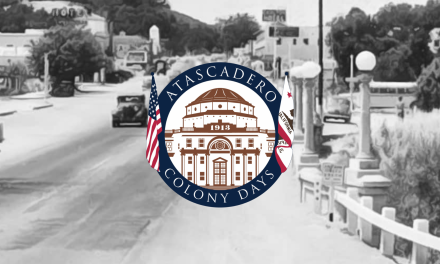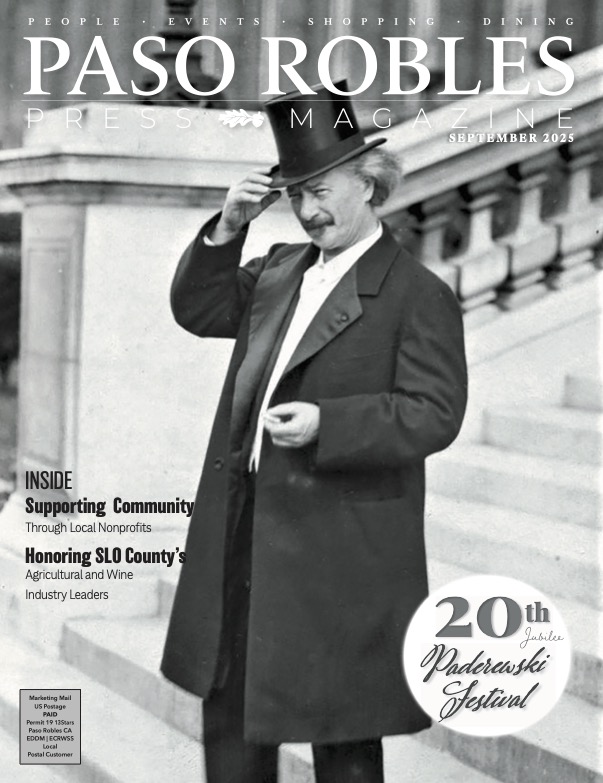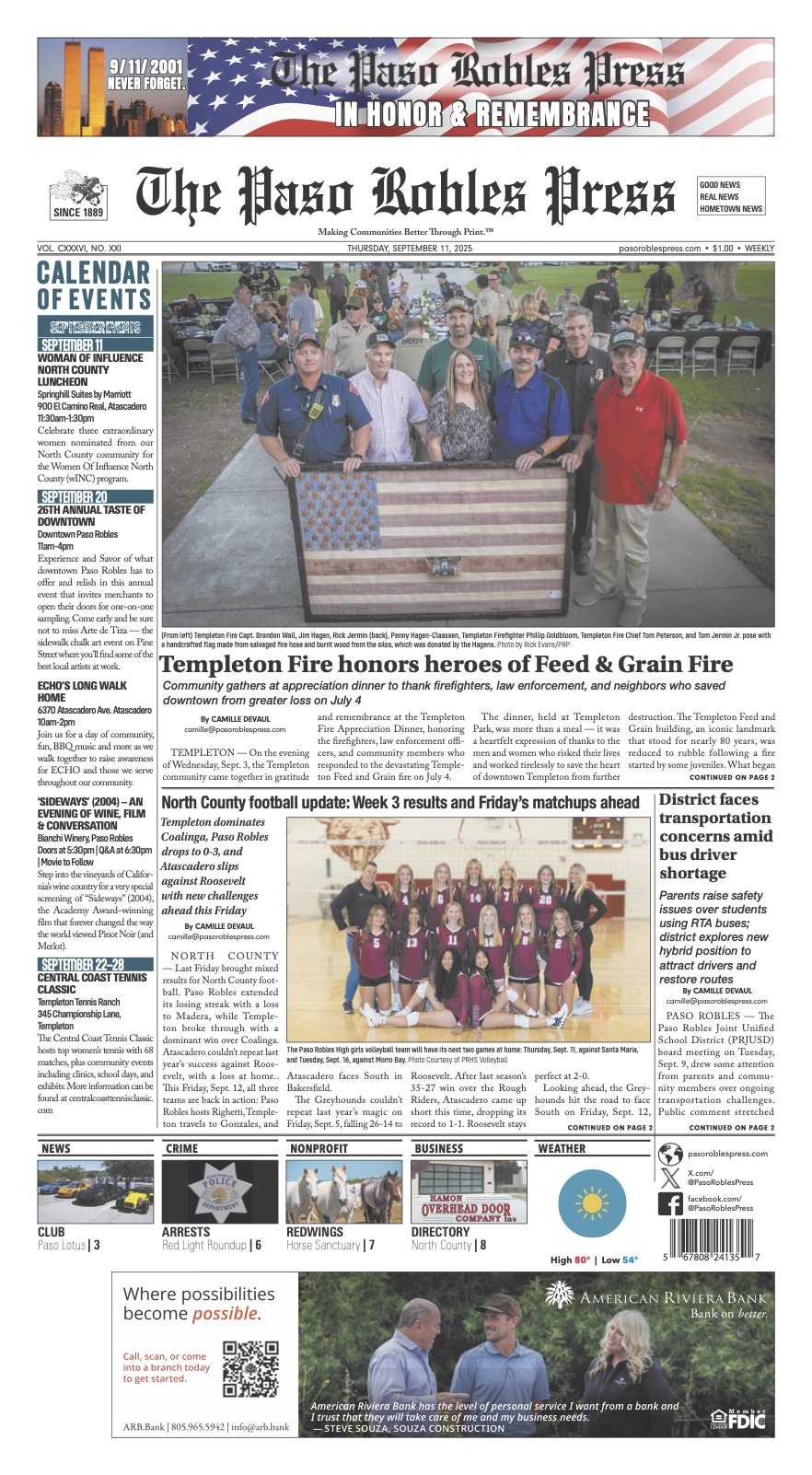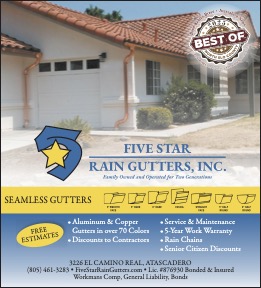‘The Maestro’s’ grand nephew and filmmaker Mark to attend showings of documentary on André Tchelistcheff
Paso vintners and wine aficionados are in for a treat with the unspooling of the film “André: The Voice of Wine,” scheduled for 7 P.M. on March 15 and 16 at Park Cinemas. The screenings, part of the San Luis Obispo International Film Festival, are sponsored by Paso Wine Alliance, Travel Paso and History Project Dalidet Adobe and KRUSH 92.5. A third screening is scheduled on March 17, 1 P.M. at San Luis Obispo’s Fremont Theater.
Narrated by Ralph Fiennes, the 98 minute feature documentary tells the extraordinary story of enologist André Tchelistcheff, a seminal figure in California’s wine industry, who has rightly been hailed as the “Dean of American Winemaking.” The legendary Russian émigré almost singlehandedly elevated the quality of winemaking in the US after the repeal of Prohibition and mentored such protégés as Robert Mondavi, August Sebastiani, Mike Grgich, Warren Winiarski and Heidi Barrett.
The late winemaker’s journey over five decades is brilliantly captured by his grand nephew and filmmaker Mark Tchelistcheff, founder of Open Films. Mark whose films have been screened in international festivals from Tokyo to Telluride, will be in attendance at both the Paso and San Luis screenings.

André Tchelistcheff’s grand nephew and filmmaker Mark
“The Maestro,” as André was called, left an indelible mark in the wine world especially in California working at such stellar wineries as Beaulieu, Charles Krug, Buena Vista, Stags Leap, Niebaum Coppola, and Chateau St. Jean.
He also left a lasting imprint in Paso advising local pioneer, the late Dr. Stanley Hoffman, back in 1973 on his 1,200-acre Hoffman Mountain Ranch (HMR) Vineyard in the Adelaida region.
According to a 1979 interview by Ruth Teiser and Catherine Harroun with Tchelistcheff, Hoffman who already had his vineyard up and running by then, sought advise from the Maestro and was told that investing in a winery in Paso would be “a gamble.”
“Nobody knows what kind of wines you are going to make, and nobody knows how you are going to be able to sell these wines, Tchelistcheff told Dr. Hoffman. “It’s wines from a region that’s unknown, and I would be rather careful. Let’s go and inspect the vineyards and see what kind of vineyards you have. Let me think about it, and then I will send my recommendation.”
Upon inspecting the site, though, Tchelistcheff was impressed with the gravely loam soil similar to Burgundy and Champagne. But the vineyards were under poor management. So he did come on board and over time mentored Hoffman’s sons, David and Michael, with his expertise, elevating HMR wines to a world-class level.
“The film’s been ten years in the making,” said Mark Tchelistcheff in a phone call from Berlin where he is currently based. “It’s been a long, wonderful and excruciating journey.”
Encouraged by a friend, Mark was inspired to embark on the documentary soon after Tchelistcheff was inducted in the Vintners Hall of Fame at the Culinary Institute of America at Greystone in Napa Valley. Along the way Mark made certain to immerse himself in André’s Russian roots.
“I went back to the land where our estate was burnt down and destroyed by the Bolsheviks,” he reflected. “I walked the streets where he walked.” His vision was to capture André’s Russian soul, his “interior terroir of a human being. His terroir started in czarist Russia.”
What were some of the challenges? I ask.
As is true with most documentary filmmakers, there was the financial challenge that was met with support from the likes of Tom Jordan (Jordan Winery), Miljenco and Violet Grgich and Austin Hills (Grgich Hills Cellars), along with Russian wine lover and benefactor Andre Spirin and the Chandler family.
Then there was the matter of finding original material, not just in the U.S. but also in France, Italy and Russia.
“Unlike a famous actor who is in the limelight, with André it was difficult to gather material,” Mark noted.
Five years into the making of the film, Mark came upon a treasure:
A box discovered in Mike Nieman’s vintage motorcycle shop and garage in St. Helena. “I found his original 8-millimeter camera and projector that André was filming about his life in the ’40s and ‘50s,” marveled Mark. This rare footage plus interviews with Tchelistcheff conducted by various news organizations in the 1970s and ‘80s is what gives the film real intimacy.
Mark, who grew up in Asia, fondly recalls spending summers in Napa Valley with Uncle André who was like a second grandfather to him. “He was a big figure in my life because he was such an impressive person and he was so wonderful with children and with me. I was lucky to have him but
I had no idea of his importance within his industry. Only later on I learned of this.”
The filmmaker reminisced about his grand uncle’s charisma and his playful and mischievous nature. Moments like driving with him in his yellow 240Z car. “He was a mad driver — good but very fast.”
Yet Tchelistcheff himself lived very simply. “He kept his wine under his bed or in a closet,” Mark reflected. “People would bring him beautiful wines and he would open them. He had no cellar.”
Mark pointed out that as the film concludes, André’s widow Dorothy comments that at the end of Andre’s life he didn’t think he had accomplished enough. “He was an old aristocrat and extremely modest,” said Mark fondly of his grand uncle.
Park Cinemas screening schedule:
March 15, 7 P.M. – “Heart of Paradise,” 29-minute short
7.30 P.M. – “André: The Voice of Wine”
March 16, 7 P.M. – “André: The Voice of Wine”
Tickets are not sold in advance, but will be available first come-first served on the day of the screenings at Park Cinemas box office. Festival pass holders have priority until 6.45 P.M.











